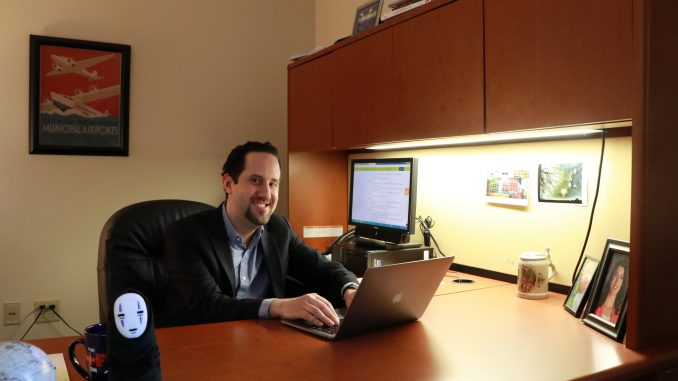
By Christian Garcia:
“What the heck is going on here?” That’s the reaction first-time visitors to Amarillo College history professor Eric Fauss’ classroom often have. In one corner of the room, a group of students is rehearsing speeches. Dressed in homemade costumes, the students interrupt each other frequently with suggestions and laughter as they work together to craft their presentation. On the other side of the room, a different group makes signs and argues about women’s suffrage. As voices raise in friendly debate, one student grabs his textbook and reads aloud from a passage that supports his argument. It’s loud, chaotic and intensely interactive. It’s a typical day in Fauss’ class.
Fauss teaches both U.S. History I and II and says he loves every bit of it. According to Fauss, his favorite part about teaching the classes are toward the end of the semester called ‘Reacting to the Past,’ a role-playing, history game in which members of the class are assigned to an actual, non-fictional character from a certain historical event in American history to capture how life was back then in that specific character’s perspective and point of view.
“I really liked it and thought it was very interactive. It was kind of like being in a history textbook rather than just reading one,” said Cameron Babcock, a psychology major.
“I liked having him in class. The way he teaches history is much better than anyone else that I’ve had in history classes in middle and high school,” said Bryan Arvello, mass media major.
Fauss started with earning his bachelor’s degree at the State University of New York at Potsdam and later on earned his master’s and Ph.D. at the University of Connecticut. Another reason why he teaches at AC rather than a university is because he loves how determined the college is to help students achieve their goals.
“I believe AC, is extremely dedicated to their students and I love to be a part of that in any way that I can,” Fauss said.
Fauss said he specifically wanted to become a college professor to teach adults simply because he believes they are more complex than high school or middle school adolescents. Some students would agree that his style of teaching is unique and understandable.

Leave a Reply